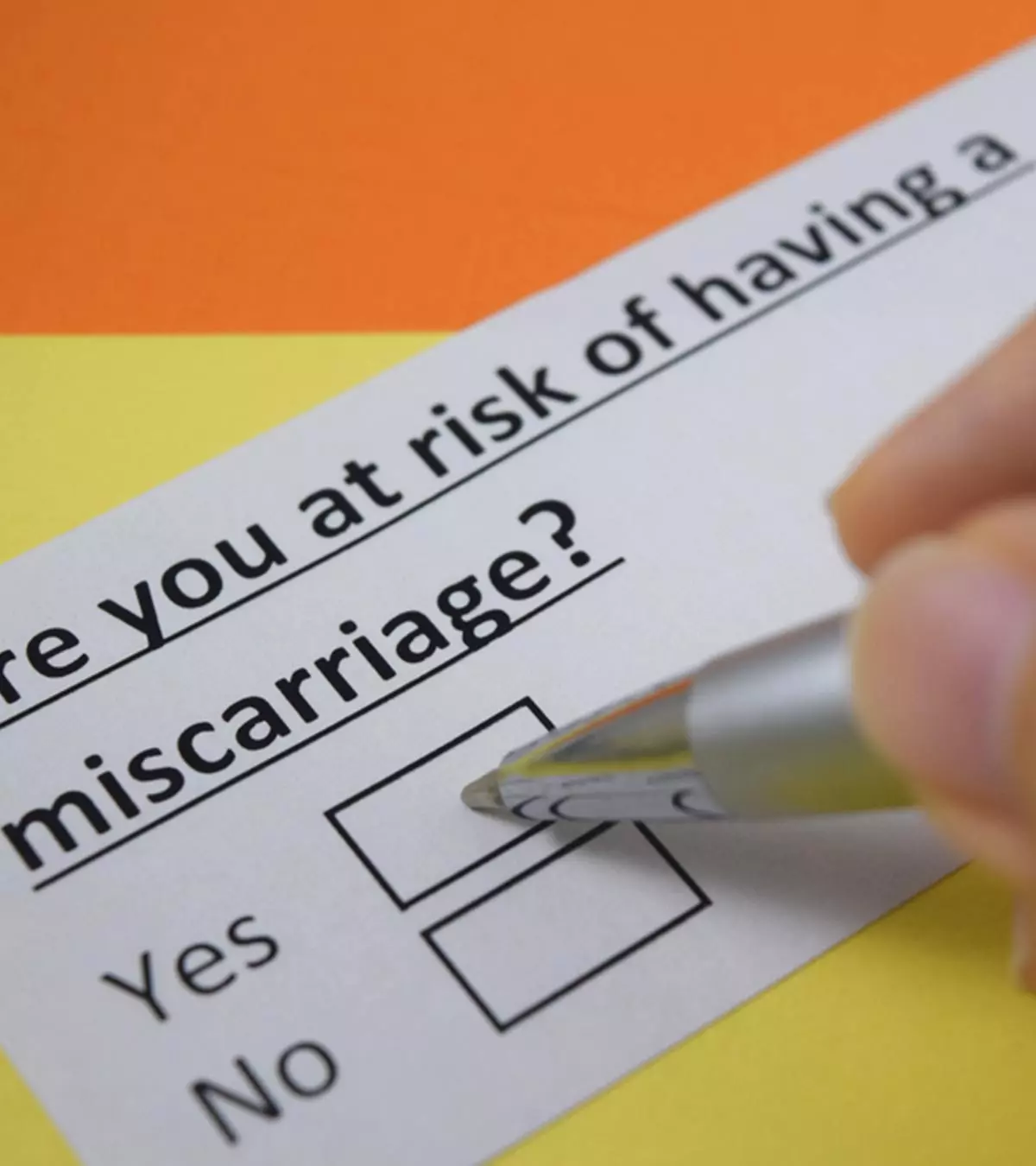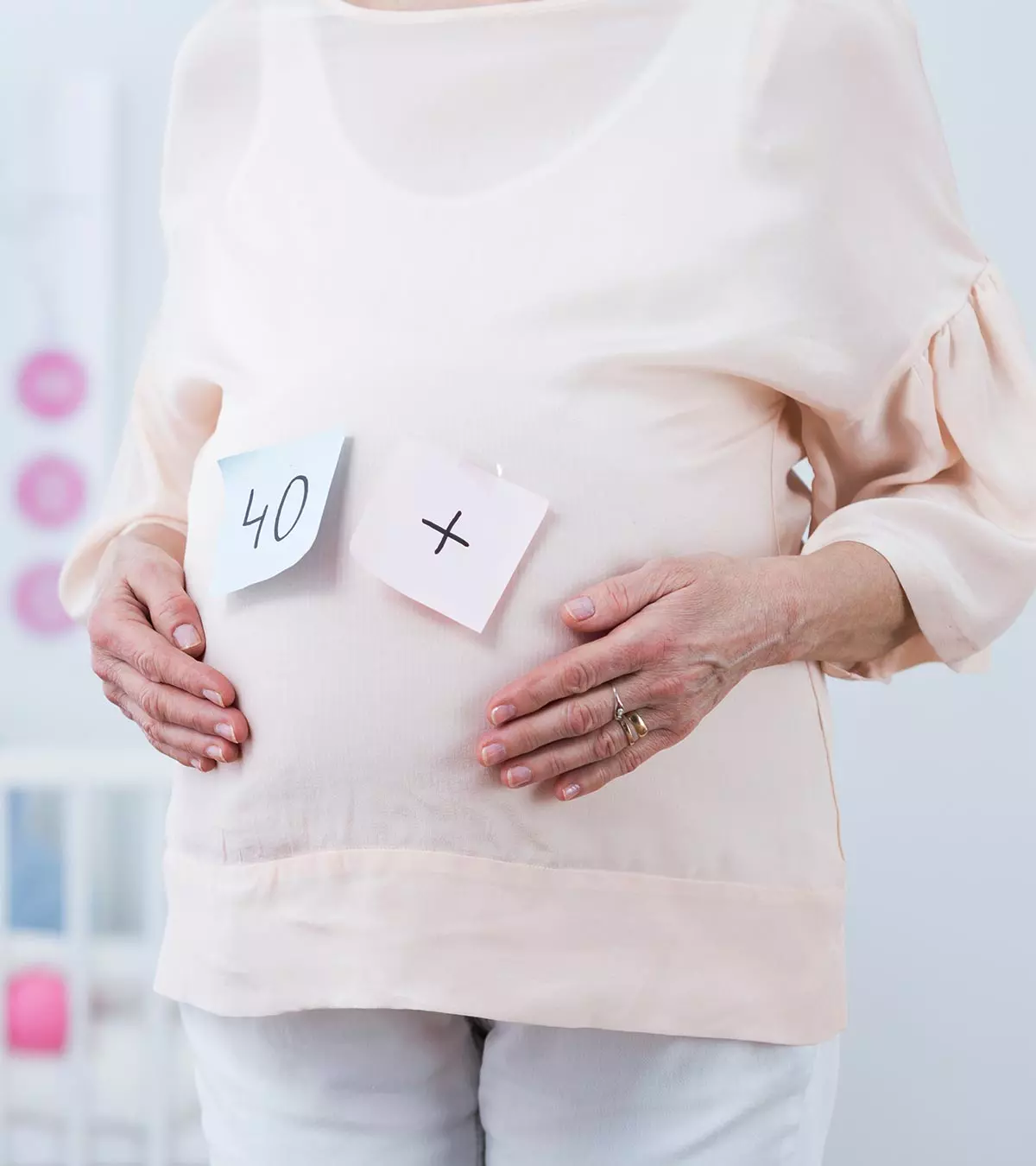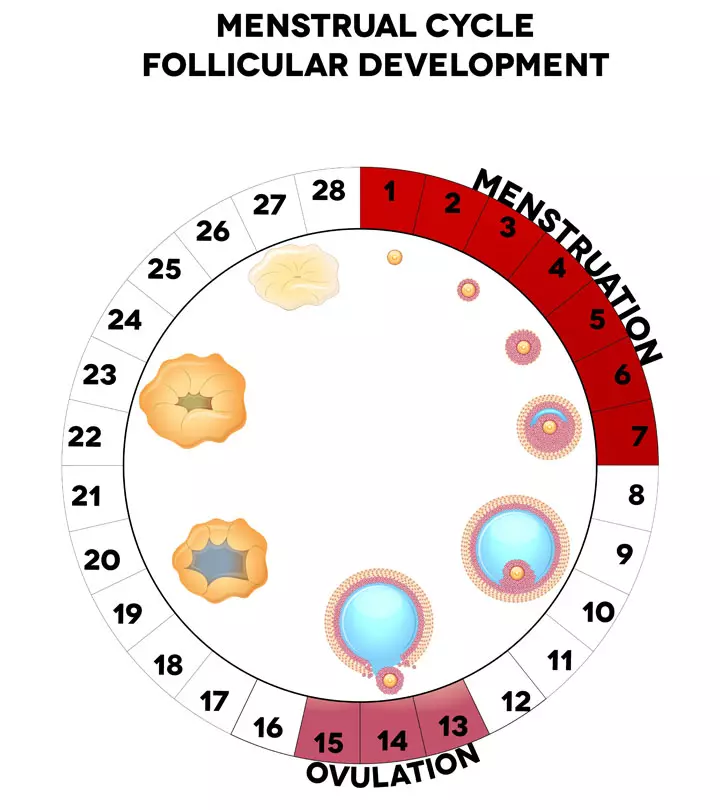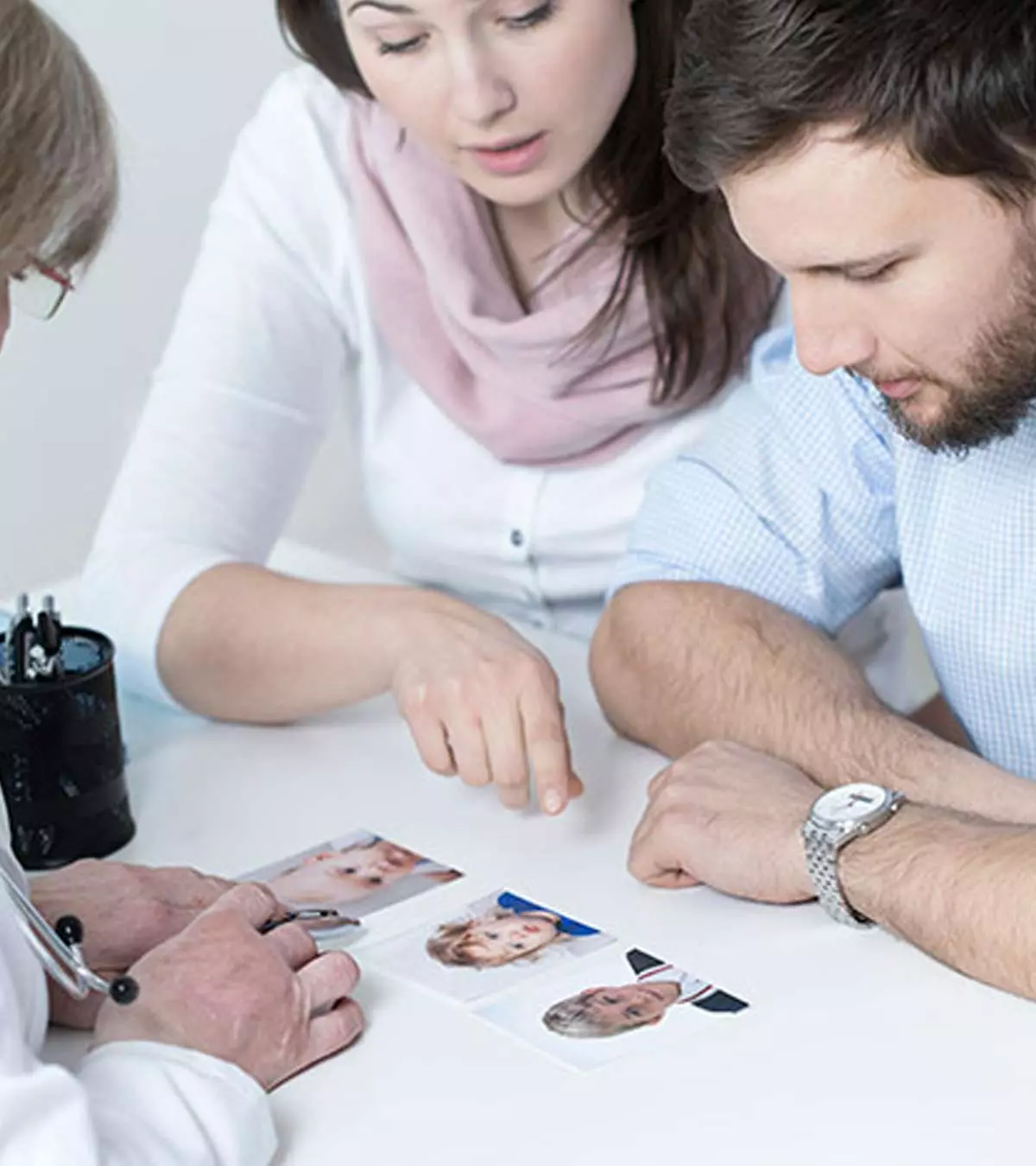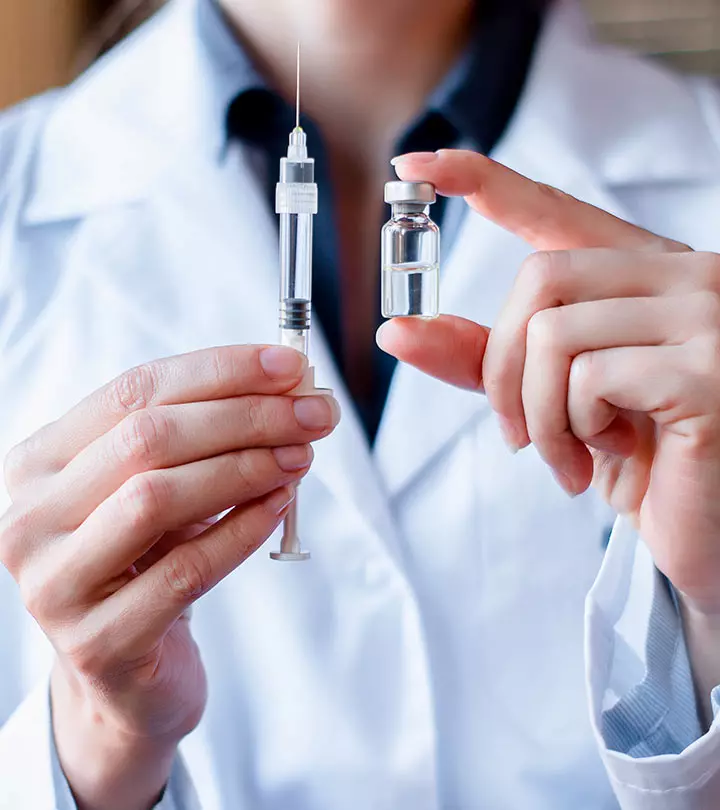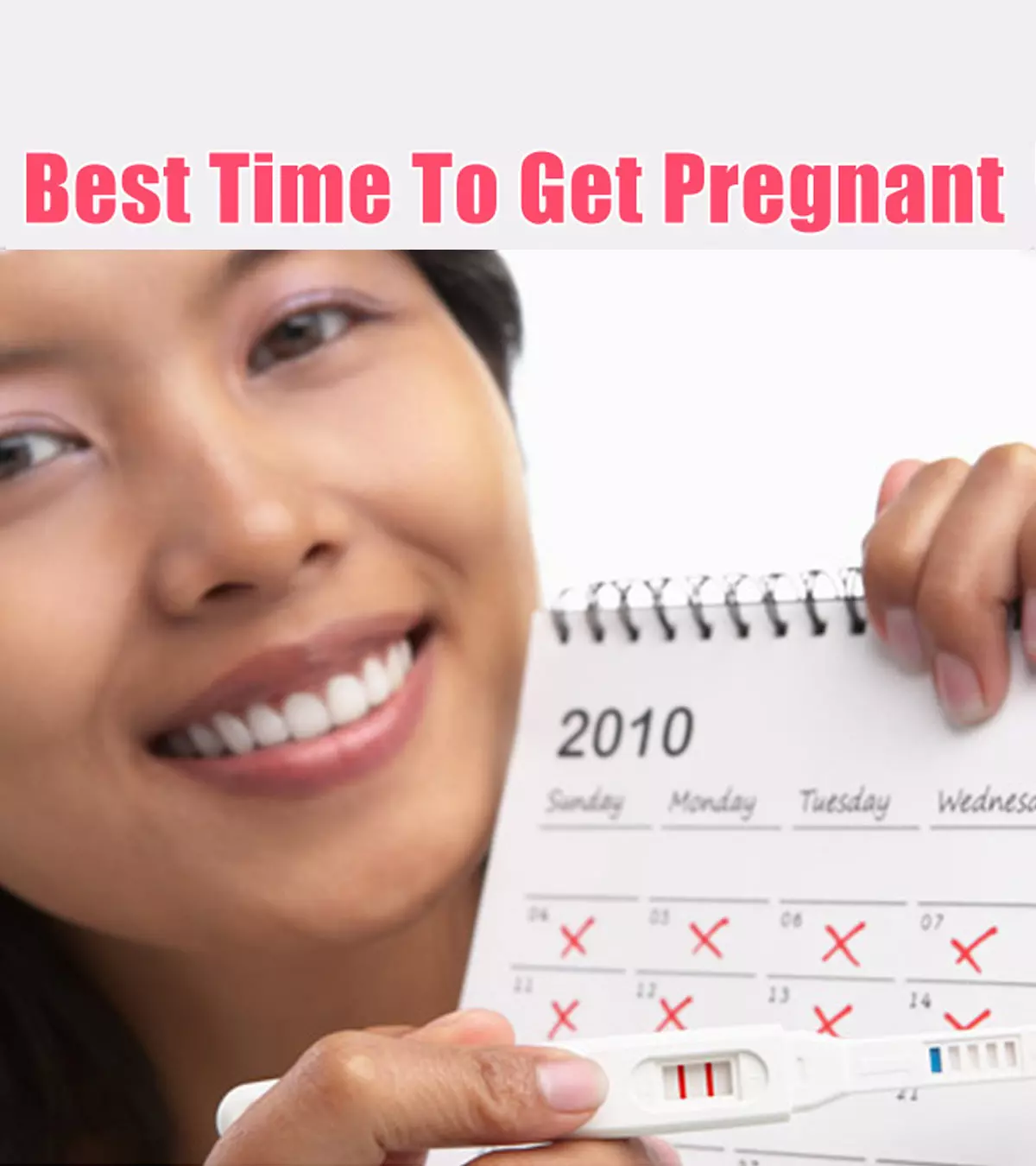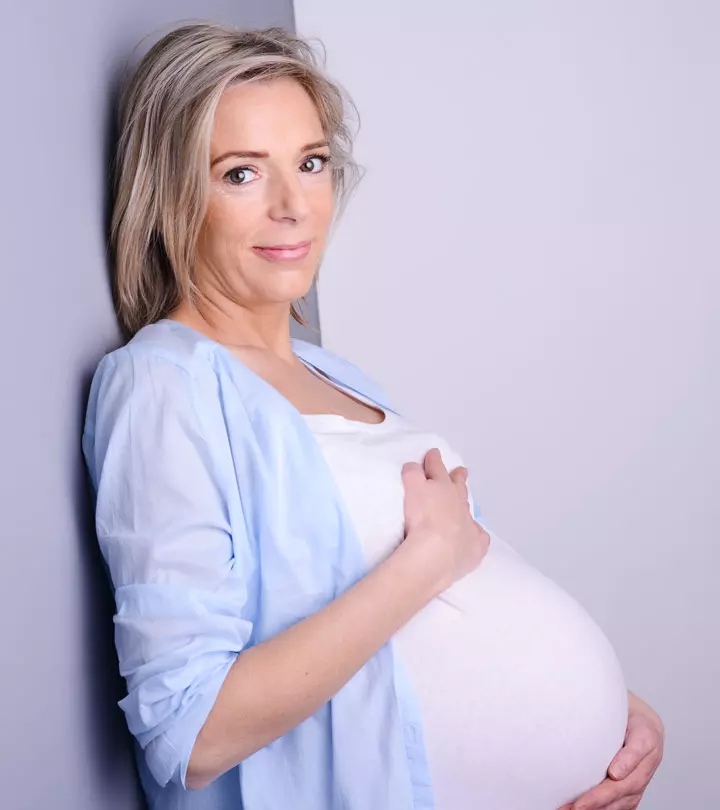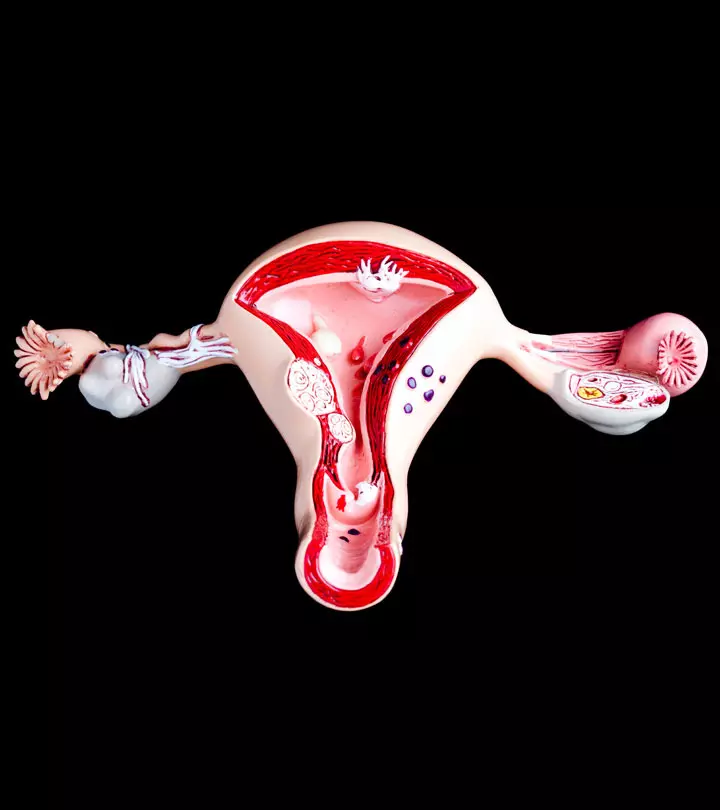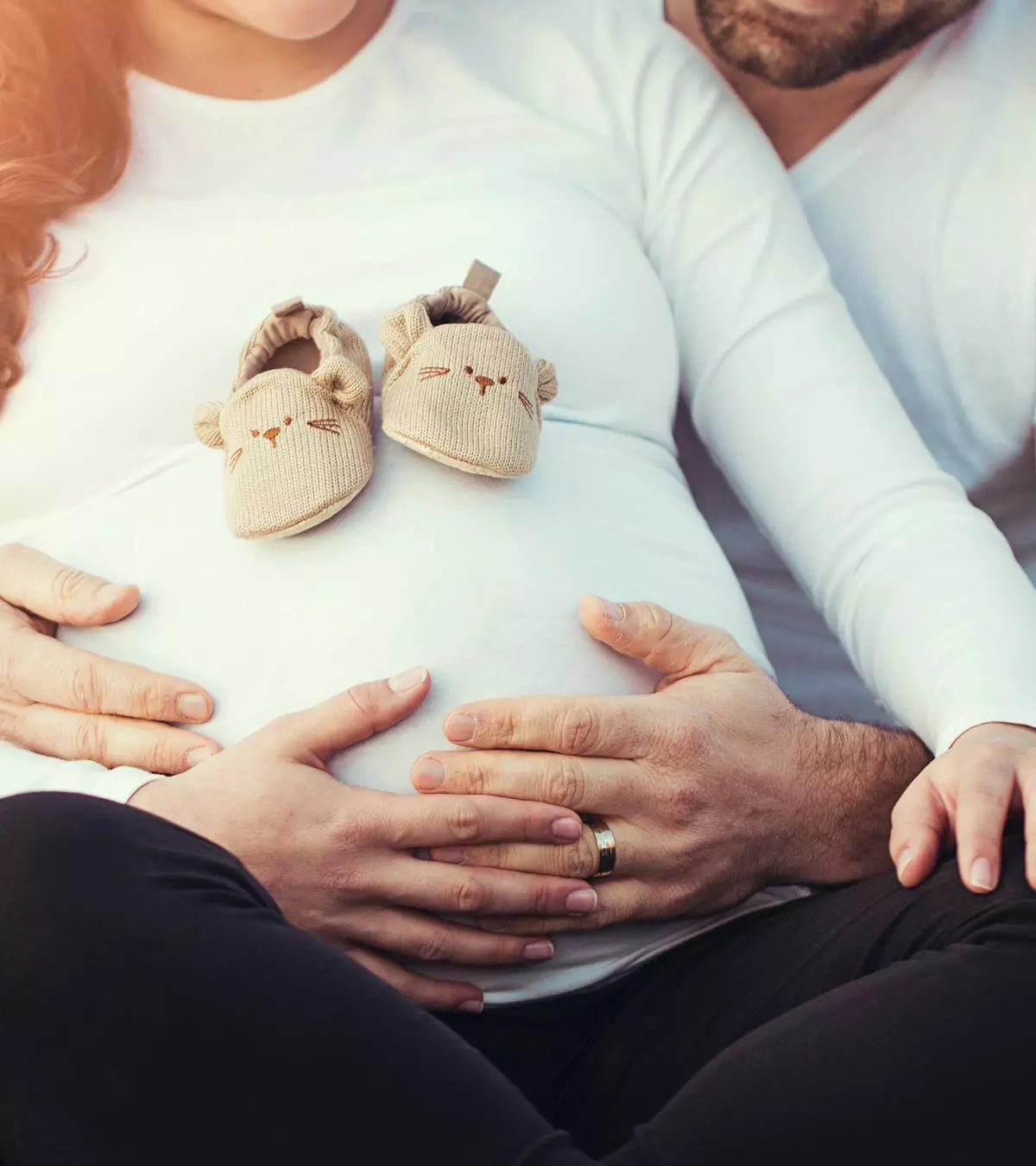
Image: Shutterstock
Earlier, having babies after a certain maternal age was considered risky and unthinkable. However, with the recent trend of celebrities having babies at or above 45, people have even begun considering pregnancy after age 50 (elderly primigravida). Though it is possible to conceive at 50 or higher, certain factors may make the journey from conception to a healthy pregnancy tough for older women. Read this post to learn more about becoming pregnant after 50, including its advantages and drawbacks.

Key Pointers
- Conceiving after age 50 via egg donation and in-vitro fertilization may be difficult due to decreased egg quality after age 40.
- Specialists recommend that older women take certain steps to prepare for pregnancy, such as consulting a doctor, taking tests, and undergoing a psychological evaluation.
- Benefits of becoming pregnant after 50 include financial security, experience, and longer life.
- Possible disadvantages may include health scares, physical exhaustion, and risk to newborn.
- Speaking with a specialist can assist you in learning about your options and making an informed decision.
Pregnancy After The Age Of 50
Usually, a woman may not get pregnant after she attains menopause, a state in which she is devoid of menstruation for a year. According to the US CDC, the average age for menopause in most women is 52 years, post which it becomes impossible to conceive naturally. During menopause, a woman’s menstrual cycle becomes inconsistent and eventually ends (1).
After 40, the egg’s quality deteriorates though the periods are regular, making it difficult to conceive a healthy baby, especially after 42. According to the American College of Obstetricians and Gynecologists (ACOG), approximately one in ten women will conceive per menstrual cycle by age 40 (2).
Moreover, by menopause, women are left with 1000 eggs in the ovary (3). On the other hand, in men, sperm quality is good at least till the age of 60; nevertheless, paternal age also increases the risk factor for genetic defects (4).
Therefore, it is quite rare to have a completely healthy gestation at or after 50. However, if women above 50 years wish to get pregnant, they can conceive via assisted reproductive technology using donor-egg in vitro fertilization (IVF) processes (5). In fact, according to the 2018 National Vital Statistics Reports on births per year, a total of 959 births have been reported in women aged 50 years and more (6).
 Point to consider
Point to considerReasons Women Might Want To Get Pregnant At 50
Earlier, the average age of women was around 20-25 years to get married and start a family. However, nowadays, women are now preferring to get married and conceive later in their age. Some of the reasons for these changes are:
1. Financial security
Waiting to become a mother also has its share of financial benefits (7). A US study found that a woman’s earnings increase 9 to 10% every year she delays having a child. When you are a parent, especially a single parent, and are late for work, it can cost you your job. Very few bosses are considerate of single mothers. So you will be a lot more relaxed at this stage of life, both mentally and financially.
2. Higher experience and increased maturity
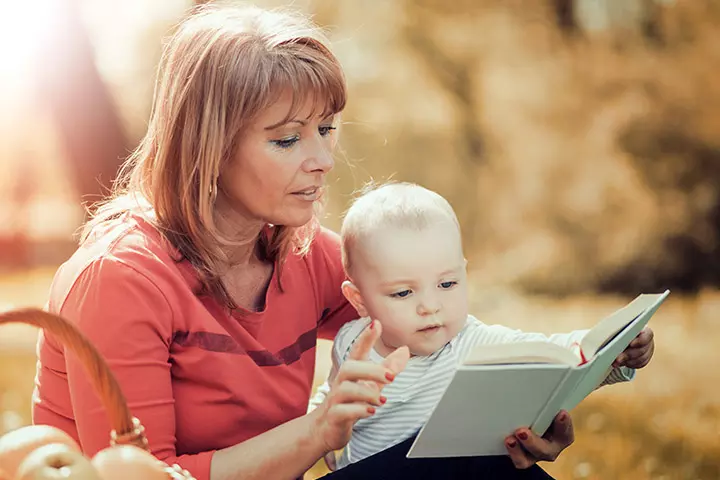
One of the biggest advantages of late pregnancy and parenting later in life is that you have seen the most of the world and know how things work. You are more comfortable, secure in your career, emotionally mature, and are likely to make wiser parenting decisions (7).
3. Increased life span

A study by the University of Utah found that women who have babies in their 50s tend to live longer, whether they conceive naturally or through other methods (8).
How To Get Started?
To give yourself a chance for a normal pregnancy and a healthy and fit baby, we would suggest you take a few steps before you try to conceive. Here are a few tips to help you prepare for the pregnancy (9).
- If you are in your 50s, consult a fetal specialist, if you don’t get pregnant even after having unprotected sex for over six months. Or you can visit a specialist right away, especially if you have specific reasons for not being able to get pregnant like ovulation difficulties, irregular or missed periods or problems with your spouse’s sperm.
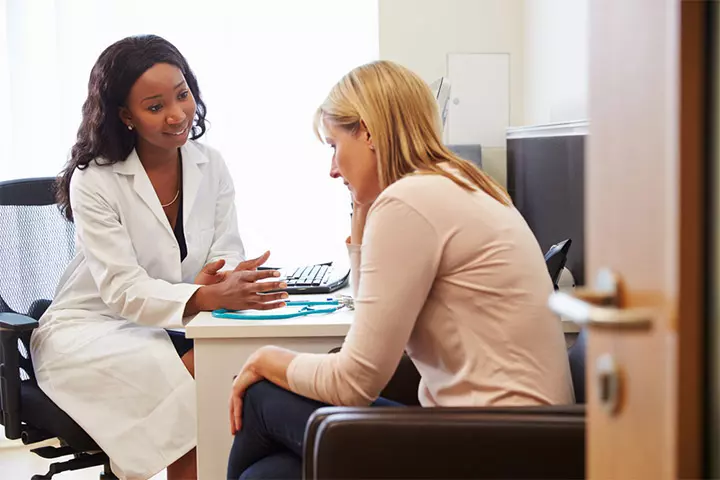
- The specialist will prescribe some tests to check whether you have problems with the ovaries function or ovarian reserve. He will also check for problems with the Fallopian tubesi or with your partner’s sperm.
- If everything is fine, then most probably, your egg quality has declined, or you are facing issues in conception due to age-related infertility. The specialist will next advise you on the options, depending on your condition. Infertility treatments, such as in vitro fertilization and egg donation would most probably be recommended.
- For the egg donation method, you will first be screened, which includes an ultrasound of the uterus to ensure that you can carry the baby and blood tests. Then you have to go through a psychological evaluation to make sure that you are mentally prepared to have a baby who is not genetically related to you.
Sally Cooney, who became a mother for the first time at 51, shares her experience undergoing the screening. She recalls, “Dr. Janet Choi came out to explain the procedure to me. I would be put under very briefly, and she would examine my uterus with a camera to see if there were any obvious deformities that would prevent me from having at least a chance to carry a baby to term. I was wheeled into a small procedure room and put under. In what seemed like ten seconds, I woke up in the post-op area, and a nurse called Dr. Choi in. She told me, “Your uterus is fine; it’s a perfectly structurally sound cavity” (i).”

- Internist would be the best person to look into this matter. The internist will have a look at anemia, hypertension, pulmonary problems, heart problems, diabetes and other conditions that could get worse during pregnancy.
- Once the woman is cleared, she will take hormone therapy with estrogeniA hormone responsible for the development and functioning of female reproductive organs , hormones, and progesteroneiA female reproductive hormone that plays an important role in menstruation, pregnancy, and breastfeeding for four and a half weeks to prepare her uterus for receiving the fertilized eggs. After the egg is implanted in her uterus, the woman will continue to take the estrogen for another eight weeks. Besides, she will also prescribe progesterone, a shot that she has to take home until the 10th week of pregnancy.
Drawbacks Of Getting Pregnant At 50 Years Or After
Postponing parenthood and having babies at and after 50 can also cause some serious problems. These include:
1. Maternal Health Risk
In the year 2012, a study revealed that the health of women aged 50 or older who conceived using donated eggs was as good as for the younger recipients, provided they were well cared for during and after pregnancy (10). However, some medical risks do exist. In 2016, the Ethics Committee of the American Society for Reproductive Medicine (ASRM) stated that even if the pregnancy after 50 years has been made possible through egg donation, women with underlying conditions, such as diabetes and hypertension, should be “strongly discouraged or denied” for embryo transfer (11).
Late pregnancy increases the possibility of diabetes, hypertension, preeclampsia (a complication characterized by high blood pressure), and miscarriage in women. In addition to these complications, growth restriction, stillbirth, preterm delivery, and multiple births are potential fetal complications associated with advanced maternal age (7). Furthermore, high-risk pregnancies, which are more common in older women, can increase the risk of cesarean section and maternal mortality (12). Therefore, it is important to consult healthcare professionals to assess your health status and ensure a safe and healthy pregnancy.
 Quick fact
Quick fact2. Physically Harder
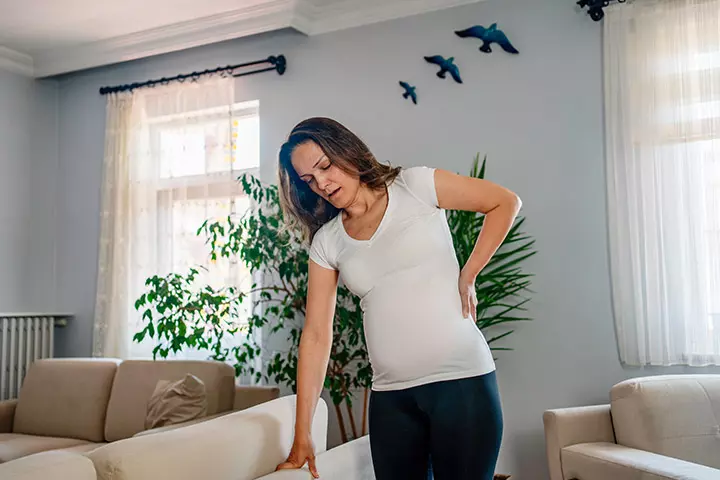
Pregnancy is physically hard on older women, and the weight of carrying a child can be more stressful for women than it would be for young women (7). The physical strain can also take an emotional toll on some women. Seeking support through counseling or joining support groups can provide valuable help and guidance in these situations.
3. Risk To Newborns
Not just the mom-to-be, even the newborns face certain risks, such as chromosomal abnormalities, such as Down syndrome preterm birth, and congenital anomalies. You can minimize the possibility of these risks by using the eggs of young donors (7). In addition, you may go for genetic counseling to learn the risks and benefits of different reproductive options and any potential genetic risks associated with advanced maternal age.
4. Financial Strain
One last thing, while there are monetary advantages of having babies later in life, there are liabilities as well. The more you wait, the more likely you are to continue working at an older age. You will have financial responsibilities at a time when most of your friends are planning retirement. Healthcare and life insurance are likely to get even more expensive. And the cost of fertility treatments adds up to the burden. The burden can be particularly challenging for low-income people as these treatments can be expensive.
5. Social Stigma and Anxiety
According to the World Health Organization (WHO), one in every five pregnant women undergo stress, anxiety, and other mental health issues anytime during their pregnancy or after birth (13). However, maternal stress may become higher in women undergoing pregnancy after 50 years of age. They may feel more stressed and anxious about their high-risk pregnancy associated with advanced maternal age. Additionally, societal judgment and lack of support can stress them more.
Frequently Asked Questions
1. What are the chances of getting pregnant at 50?
The chances of getting pregnant at 50 years are low since the chances of conceiving naturally in a monthly cycle reduce to around 5% by age 40. Also, the chances of success with assisted reproductive technology, such as IVF techniques, drop to about 11% by 44 years (14).
2. What is the oldest age a woman can get pregnant naturally?
It is unlikely to have a successful natural conception after 45 years of age (2). Therefore, if you are planning a pregnancy at 40 or older, it is important to get a preconception checkup to understand the factors that could affect pregnancy outcomes.
3. Can I get pregnant at 50 with no period?
Natural pregnancy is impossible after age 50 if your periods have stopped. However, you can use donor eggs and in vitro fertilization techniques. Women may also freeze (cryopreserve) their eggs at a younger age to use them later. However, pregnancy at 50 has been associated with more complications, such as a higher likelihood of hospitalization, pregnancy hypertension, gestational diabetes, and increased instances of low birth weight in babies (15) (16).
4. Do I need contraception at 50?
Experts recommend that women continue using contraceptives until menopause or age 50 to 55 to avoid the risk of spontaneous pregnancies (2). It is because becoming pregnant at an advanced reproductive age can raise the risk of adverse maternal and fetal complications.
Pregnancy after the age of 50 can be challenging due to the onset of menopause, but it is not impossible. With the help of egg donation and IVF, you can conceive after 50, but natural conceiving is quite rare. If you haven’t become pregnant after having unprotected sex for more than six months, see a professional for a diagnosis and alternative possibilities for conceiving. Despite the numerous health risks to both the mother and the newborn, there are some benefits to late pregnancy, such as late mothers are financially stable, comfortable with motherhood, and are bound to make sensible parenting decisions.
Infographic: Tips For A Healthy Pregnancy After 50
If you are pregnant at around 50, you may have concerns about your pregnancy and your baby. To ensure a healthy pregnancy, you should prepare yourself for specialized care. Take a look at this infographic below, as it discusses a few tips to stay healthy. Illustration: Momjunction Design Team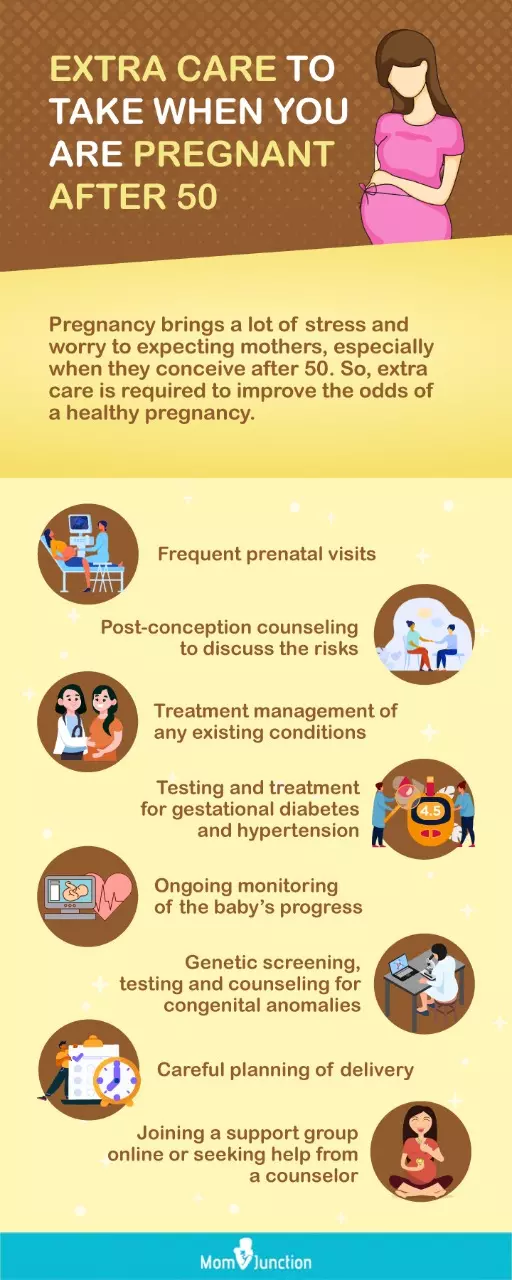
Illustration: Advantages And Drawbacks Of Pregnancy After Age 50
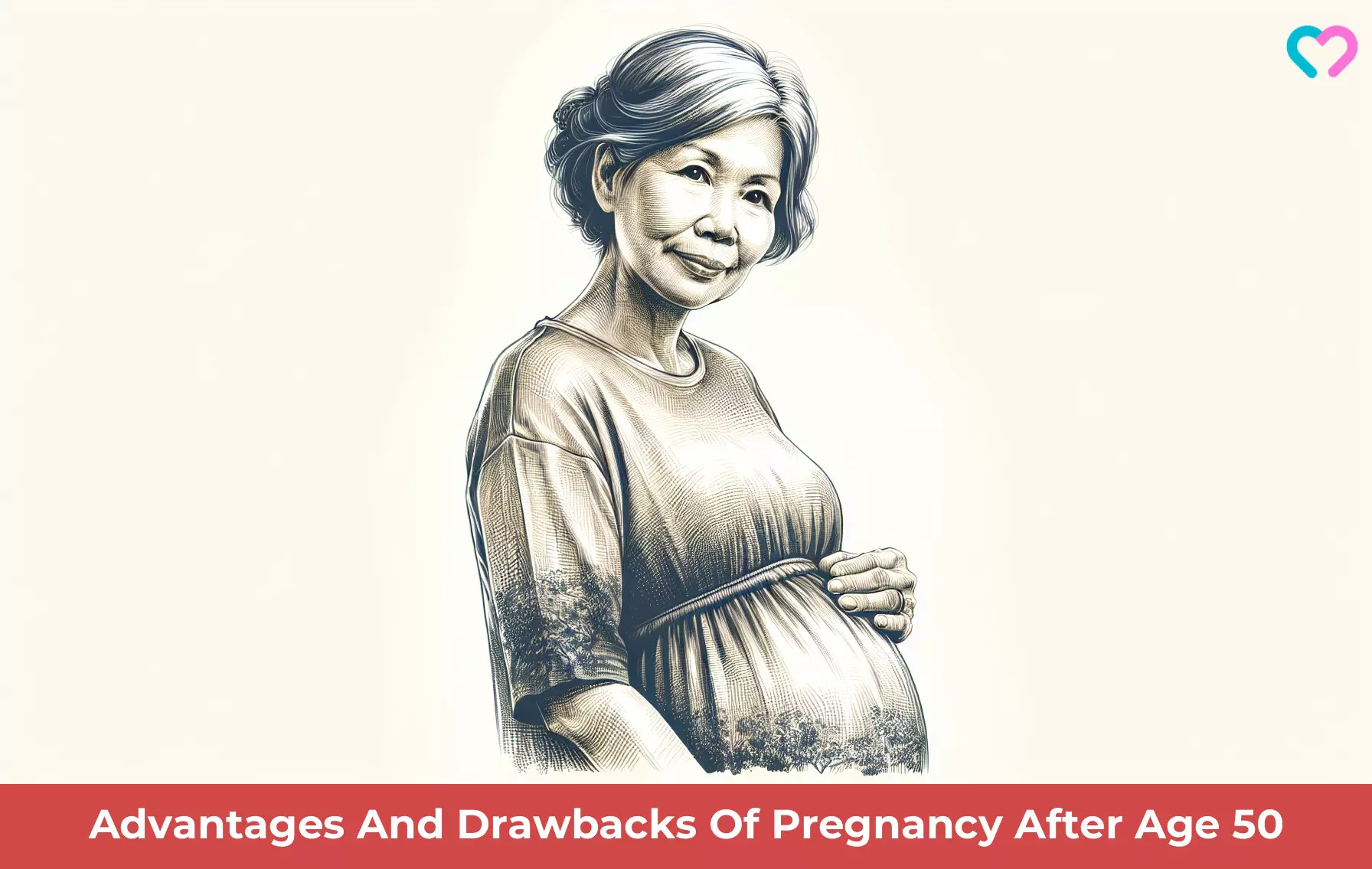
Image: Dall·E/MomJunction Design Team
Is it still possible to get pregnant at age 50? The following video discusses the risks and benefits of getting pregnant at this age.
Personal Experience: Source
MomJunction articles include first-hand experiences to provide you with better insights through real-life narratives. Here are the sources of personal accounts referenced in this article.
i. November and December, 2008https://grayhairedmom.com/2012/01/13/november-and-december-2008/
References:
- Menopause, Women’s Health, and Work.
https://www.cdc.gov/womens-health/features/menopause-womens-health-and-work.html - Having a Baby After Age 35: How Aging Affects Fertility and Pregnancy.
https://www.acog.org/womens-health/faqs/having-a-baby-after-age-35-how-aging-affects-fertility-and-pregnancy - What is diminished ovarian reserve?
https://fertility.womenandinfants.org/services/women/diminished-ovarian-reserve - Age and Fertility (booklet).
https://www.reproductivefacts.org/news-and-publications/patient-fact-sheets-and-booklets/documents/fact-sheets-and-info-booklets/age-and-fertility/ - Daniel H Kort et al.; (2012); Pregnancy after age 50: defining risks for mother and child.
https://pubmed.ncbi.nlm.nih.gov/21809262/ - Joyce A. Martin et al.; (2019); Births: Final Data for 2018.
https://www.cdc.gov/nchs/data/nvsr/nvsr68/nvsr68_13-508.pdf - Advanced Maternal Age.
https://my.clevelandclinic.org/health/diseases/22438-advanced-maternal-age - Good Genes: Late Motherhood Boosts Family Lifespan.
https://www.sciencedaily.com/releases/2009/05/090504094432.htm - IVF (In Vitro Fertilization).
https://my.clevelandclinic.org/health/treatments/22457-ivf - Risks of Pregnancy via Egg Donation Similar for Women Over Age 50 as for Younger Women.
https://www.cuimc.columbia.edu/news/risks-pregnancy-egg-donation-similar-women-over-age-50-younger-women - Exploring preconception, prenatal, and postpartum care for patients in their 50s.
https://www.contemporaryobgyn.net/view/exploring-preconception-prenatal-and-postpartum-care-for-patients-in-their-50s - Rosaly Correa-de-Araujo and Sung Sug (Sarah) Yoon; (2025); Clinical Outcomes in High-Risk Pregnancies Due to Advanced Maternal Age
https://pmc.ncbi.nlm.nih.gov/articles/PMC8020515/ - Launch of the WHO guide for integration of perinatal mental health in maternal and child health services.
https://www.who.int/news/item/19-09-2025-launch-of-the-who-guide-for-integration-of-perinatal-mental-health - Age and fertility.
https://www.betterhealth.vic.gov.au/health/conditionsandtreatments/age-and-fertility - Devini Ameratunga et al.; (2009); In vitro fertilisation (IVF) with donor eggs in post-menopausal women: are there differences in pregnancy outcomes in women with premature ovarian failure (POF) compared with women with physiological age-related menopause?
https://www.ncbi.nlm.nih.gov/pmc/articles/PMC2788687/ - Who should consider egg freezing?
https://uscfertility.org/
Community Experiences
Join the conversation and become a part of our nurturing community! Share your stories, experiences, and insights to connect with fellow parents.
Read full bio of Dr. Irene (Eirini) Orfanoudaki
Read full bio of shreeja pillai
Read full bio of Rebecca Malachi
Read full bio of Reshmi Das





